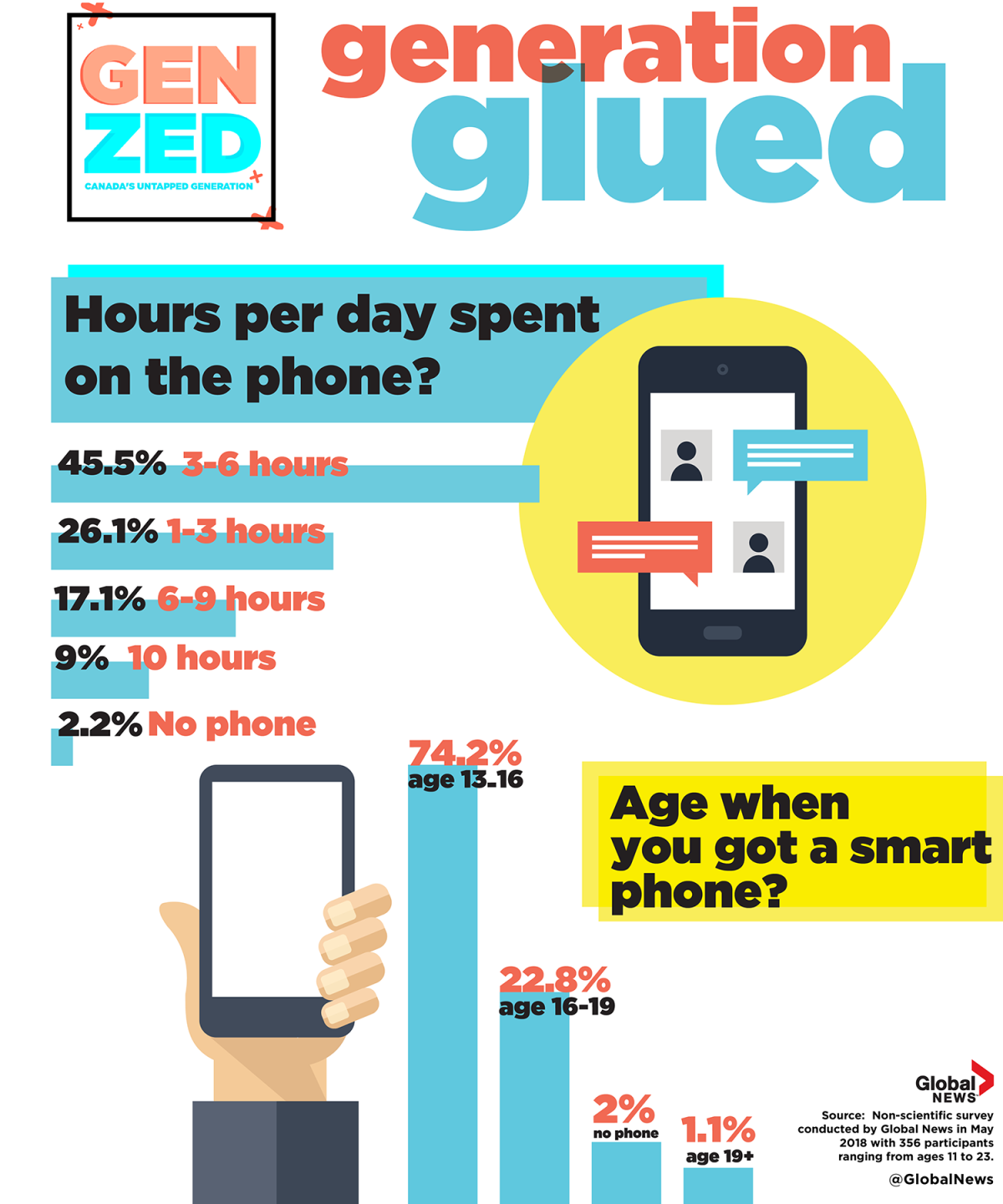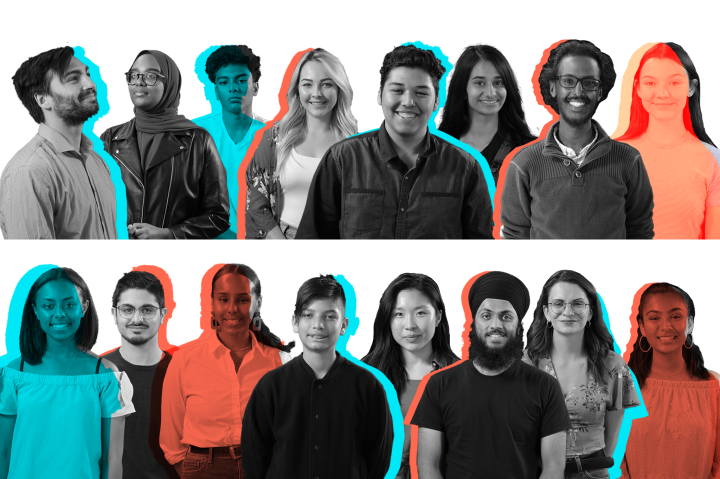
It’s hardly fair to point a finger at the young cohort of 13- to 23-year-olds known as generation Z and accuse them of being “addicted” to their phones. After all, you’d be hard-pressed to find an adult these days who isn’t constantly Googling during a conversation or checking the news during dinner.
Yet, generation Z is often on the receiving end of criticism for the amount of time they spend using technology. Some of this is fair — it’s estimated that they log about 10 hours a day online (an informal Global News survey found that number to be closer to six hours) and a whopping 96 per cent own a smartphone — but this is less an “addiction” than it is a way of life, experts argue.
WATCH BELOW: Gen Zers talk about how they use technology and social media

“Millennials and boomers are addicted to their phones. Generation Z simply hasn’t known a time without the device,” says MaryLeigh Bliss, chief content officer at Ypulse, a millennial and gen Z research and consulting agency based in New York.
“It’s not an addiction; it’s an extension of themselves. Are you addicted to your right hand?”
Generation Z makes up roughly 17.6 per cent of Canada’s total population, according to 2017 data from Statistics Canada. Although there is no established start or end date, experts say gen Z-ers are born between 1995 and 2005, making the youngest 13 and the oldest 23. Some argue the generation ends at ages 22 (1996) or 24 (1994). This is still a growing population, one that may not have had traditional life experiences (jobs, mortgages, etc.) thrown at them. They are still optimistic about what their future holds — and truly believe they can change it.
According to a non-scientific survey conducted by Global News, 356 self-proclaimed gen Zers answered a variety of questions on topics like technology and mental health. The survey found people in this age group typically described themselves as everything from tech-savvy to game-changing, and one of the most obvious characteristics was their connection to technology — a chunk of the generation doesn’t know what life is like without it.
But the overarching concern is what all this technology is doing to their interpersonal relationships. Surely, pundits argue, it’s stunting them socially.
They’re constantly connected and socially savvy
That isn’t necessarily the case, however. Since this generation is constantly connected, they are actually interacting more with friends than generations before them.
“Tech is seamlessly and vitally integrated into their friendships,” Bliss says. “To the point where we see trends like live hangouts — live streaming one friend to another — while doing mundane things like homework. They’re not even speaking.”
Indeed, in a panel interview conducted by Global News, many of the gen Z participants reported that they’re constantly in conversation with their friends, whether that’s in group chats on social media sites like Instagram or WhatsApp, or on video platforms like FaceTime.
“Technology is less intentional and more intuitive for this generation, and their social skills are morphing into a hybrid of technology and face-to-face contact,” says John Richardson, an adjunct professor at the University of Ottawa and head of English at Ashbury College.
“There are rules gen Zers follow where one person is allowed to look at their phone provided at least three others are engaged in conversation. It’s an intuitive understanding that they can’t all be looking at their phones at once.”
What Richardson is referencing is what Sherry Turkle, a professor of social studies of science and technology at MIT, calls the “rule of three.” This rule stipulates that in a group of four or more people, as long as three are actively engaged in conversation, one can look at their device without being perceived as rude or self-obsessed.
Turkle says that while this does eliminate any sense of faux pas in the action, the result is light, superfluous conversation that lacks depth. If one feels they can temporarily duck out to check their phone, surely the topic at hand can’t be that engaging, the argument goes.
But the truth is, this may pertain more to millennials and gen Xers. In an op-ed for the New York Times, Turkle referenced a 15-year-old girl who asked her father to “stop Googling” for extra facts to add to their dinner conversation. “I want to talk to you,” she told him.
This indicates that gen Zers, for all that they may be tethered to their phones, have a sense of when it’s time to put them away.
WATCH: They’re considered Canada’s most connected, open and optimistic generation, but who are they? Farah Nasser sat down with national online journalist Arti Patel to talk about this cohort of young people

‘They try to unplug’
Youngsters, it would seem, are nothing if not fickle, which means they can be full of surprises. And in this sense, gen Zers deliver in spades when it comes to unplugging.
“They see tech as vital and they love it, but they do get tech fatigue. They tell us they try to unplug,” Bliss says.
Richardson echoes the sentiment and says that gen Z kids are more likely to do things like put their phone in a drawer when they go to bed or block apps that might cause a distraction. (In our focus group, more than one gen Zer acknowledged that they deleted certain apps on their phones because they were taking up too much of their focus.)
WATCH: Generation Z: Meet Canada’s connected and optimistic generation

“Up until I was still in school, I was quite active on Facebook and Instagram,” says Harjaap Makkar, 21. “But I found that it was taking up more and more of my time and delivering lower quality content. I’ve removed those apps from my phone and only browse them when I’m on my computer, so I’m spending a more controlled amount of time on them.”
What’s more, Richardson says, gen Zers are more inclined to read a physical book versus millennials.
“My students are always on their devices, but if you ask a 16- or 18-year-old high school student if they’d rather read a book on a device or paper, they’ll say on paper, because they know they can get lost in the book more easily if it’s on paper,” he says.
“People often think of them as mindless drones, but in the research I’ve done, I’ve found them to be savvy and sophisticated in their use of technology, while also taking steps to counter distraction.”
It’s unclear just how many of them are into the idea of unplugging — the participants of our focus group who said they often deleted apps from their phone also copped to downloading them again the following day. But they are definitely cognizant of how technology (especially social media) can alter the natural flow of communication.
Bliss suspects this awareness could lead to something of a seasonal trend.
“Millennials created dry January, where they go the entire month of January without drinking, and I can see gen Zers doing something similar, where they go a month without technology,” she says. “But they’ll never reject it full-out because it’s sewn into everything they do.”
They will change how we consume technology
Of course, their sense of connection and ease with technology will have an impact on older generations too, ranging from how we buy things to how we consume entertainment.
Richardson, who has two gen Z-aged sons, notes that the concept of retail shopping is virtually foreign to them.
“My sons look at a store like it’s a giant pink elephant. They question why anyone would get in a car and drive to a mall,” he says.
And as this generation gets older and starts to move into the workplace in larger numbers, their tech culture will seep evermore into our daily lives.
We already have millennials to thank for changing how we watch television — that is, via platforms like Netflix. But gen Zers are taking this to the next level.
“They’re watching more video on their phones, live streaming and interacting via video, and that’s changing the face of entertainment,” Bliss says. “They’re pivoting entertainment to be a more mobile-focused enterprise that’s shifting the industry as well as advertising.”
It’s not as scary as it may seem, however, since this generation is showing signs of finally striking the balance between modern technology and traditional principles around social engagement.
“It’s the job of every generation to look at the next one and say everything is wrong,” Bliss says. “But once people stop looking at them like they’re doomed and they’ve been irrevocably damaged by technology, they’ll see that gen Z is very nuanced and complex.”
This week, Global News will take a look at the many ways gen Z functions, from their views on mental health and the job market to how they take part in pop culture. As you’ll see, this is still a largely untapped generation. Follow along on Twitter with the hashtag #GenZed.
— Illustrations by Laura Whelan
















Comments